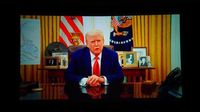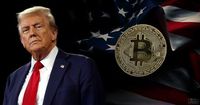U.S. President Donald Trump made waves again at the recent Digital Asset Summit in Manhattan by reiterating his commitment to making the United States the "Bitcoin superpower" and the "cryptocurrency capital of the world". Speaking via a pre-recorded video message, Trump addressed an audience filled with cryptocurrency stakeholders on the evening of March 20, 2025. This appearance marks a significant moment, as it was the first time a sitting president spoke at a cryptocurrency conference.
Criticism of the Biden administration’s cryptocurrency policies was on full display as Trump declared, "We will end the regulatory war on cryptocurrency and Bitcoin of the former administration. This includes stopping the illegal Operation Choke Point 2.0." His remarks highlighted a persistent contention in the cryptocurrency community regarding regulatory overreach, which he labeled a disgrace.
Despite the powerful rhetoric, many attendees left the summit disappointed due to the absence of new policies or executive orders that had been anticipated. Analysts noted that Bitcoin dropped significantly in value immediately after Trump’s address, plummeting to approximately $84,000.
Trump emphasized U.S. dominance in the realm of cryptocurrency and proposed the creation of legislation aimed at forming 'simple and common-sense rules' for stablecoins and market structures. He further suggested that stablecoins backed by the U.S. dollar could bolster the currency's global influence. In a rallying call to the audience, he said, "Pioneers like you can improve our banking and payment systems and bring greater privacy, security, safety, and wealth to both American consumers and businesses."
This enthusiasm for cryptocurrencies is not new for Trump, who previously spoke on similar subjects during a cryptocurrency summit at the White House. He urged the termination of what he refers to as Operation Choke Point 2.0—a term he coined to describe restrictive financial measures aimed at certain industries deemed high-risk for fraud, a concept that aligns with historical actions taken during the Obama administration that many critics claim stifled innovation.
Amidst this optimistic outlook, the reality of Trump's presidency included the signing of previous executive orders aimed at establishing a Bitcoin reserve fund and a U.S. digital asset reserve that encompasses various types of cryptocurrencies. As of January 2025, he signed multiple orders regarding digital assets, yet many in the cryptocurrency community still awaited concrete steps toward an established regulatory framework.
While Trump’s supporters lauded his push for a crypto-inclusive financial future, critics pointed to the volatility of digital assets as a concerning factor for the mainstream economy. Some sectors within the financial community expressed concern over the potential for such reserves to be seen as government endorsement of a highly speculative market that could ultimately threaten economic stability.
The subsequent market reaction to Trump’s statements mirrored this skepticism. Bitcoin, having reached new heights previously, once again faced backlash, leading to a decline that had traders and analysts concerned about maintaining upward momentum as tax deadlines approached.
In light of the ongoing discussions surrounding cryptocurrency regulations, the SEC's crypto asset task force is scheduled to hold a regulatory discussion roundtable soon, which may offer clarity on impending regulations affecting the industry and counterbalance the recent disappointments voiced at the summit.
Looking to the future, Trump's vision includes ending the culture of regulatory fear within the crypto sphere and allowing technological advancement to flourish. By doing so, he claims, the U.S. could enhance its global financial standing.
The implications of this vision are significant, as they not only relate to financial markets but also possible shifts in lawmaking that could redefine how cryptocurrencies integrate into the fabric of everyday commerce. With political divisions and regulatory interests on the table, many are eager to see how the political landscape will shape the future of cryptocurrency within the United States.
As discussions evolve, Trump's narrative positions the U.S. as an active player, hoping to attract innovation and investment, albeit within a framework contingent on reversing the previous administration's policies. The next steps taken by lawmakers—and the response from the cryptocurrency community—could significantly shape this burgeoning sector's future.





